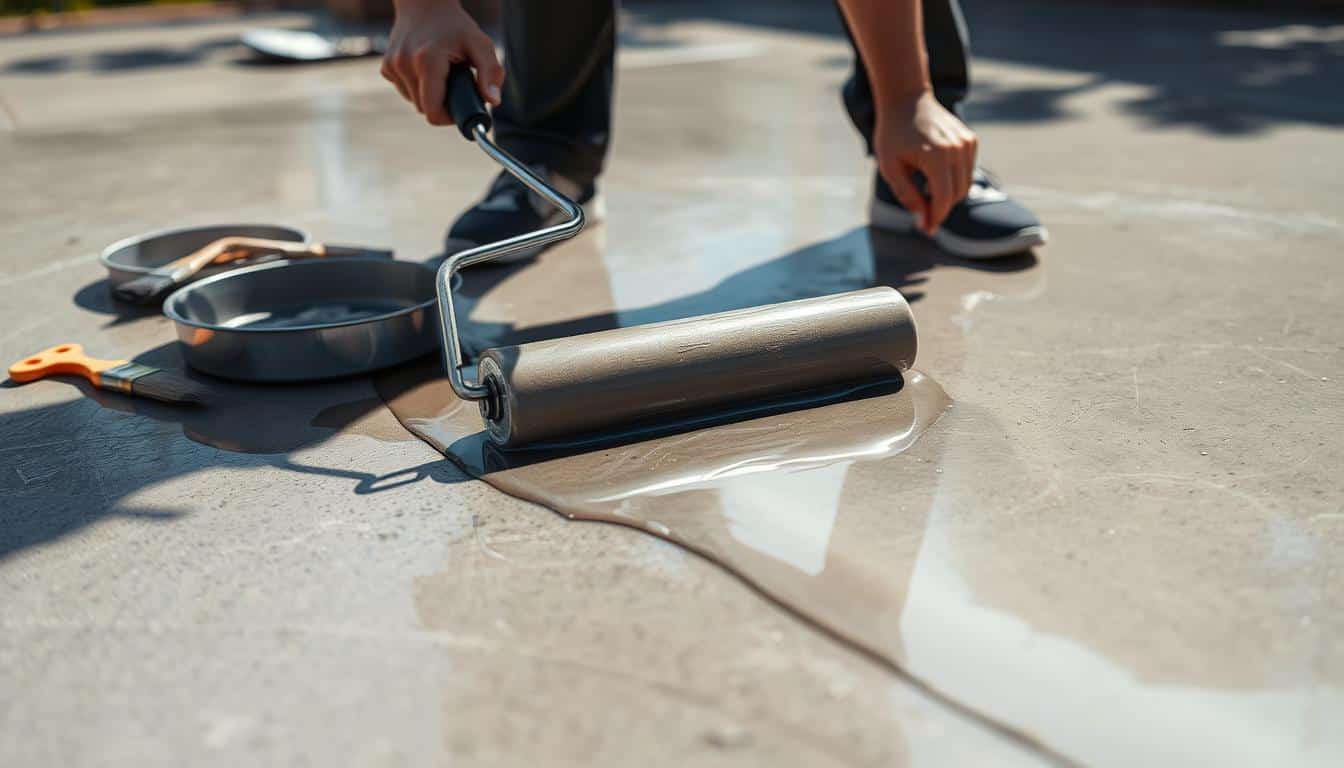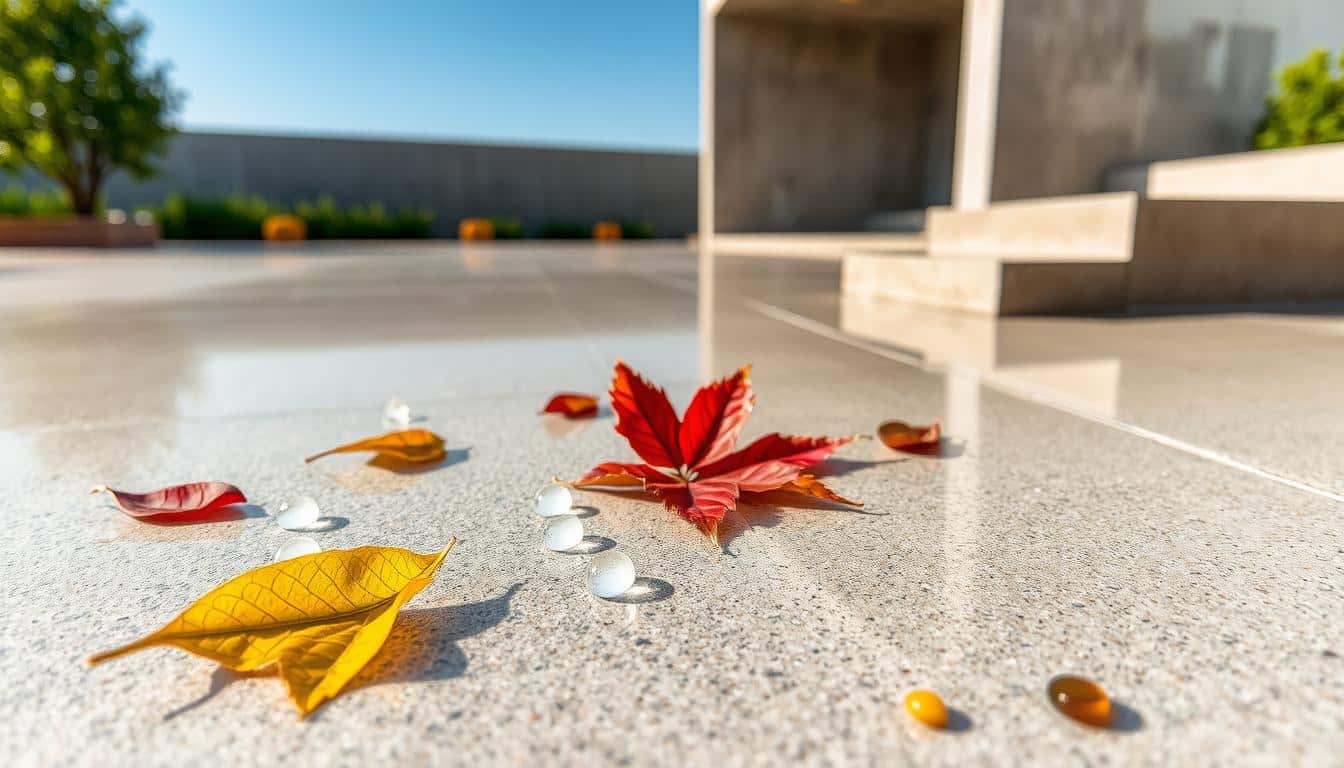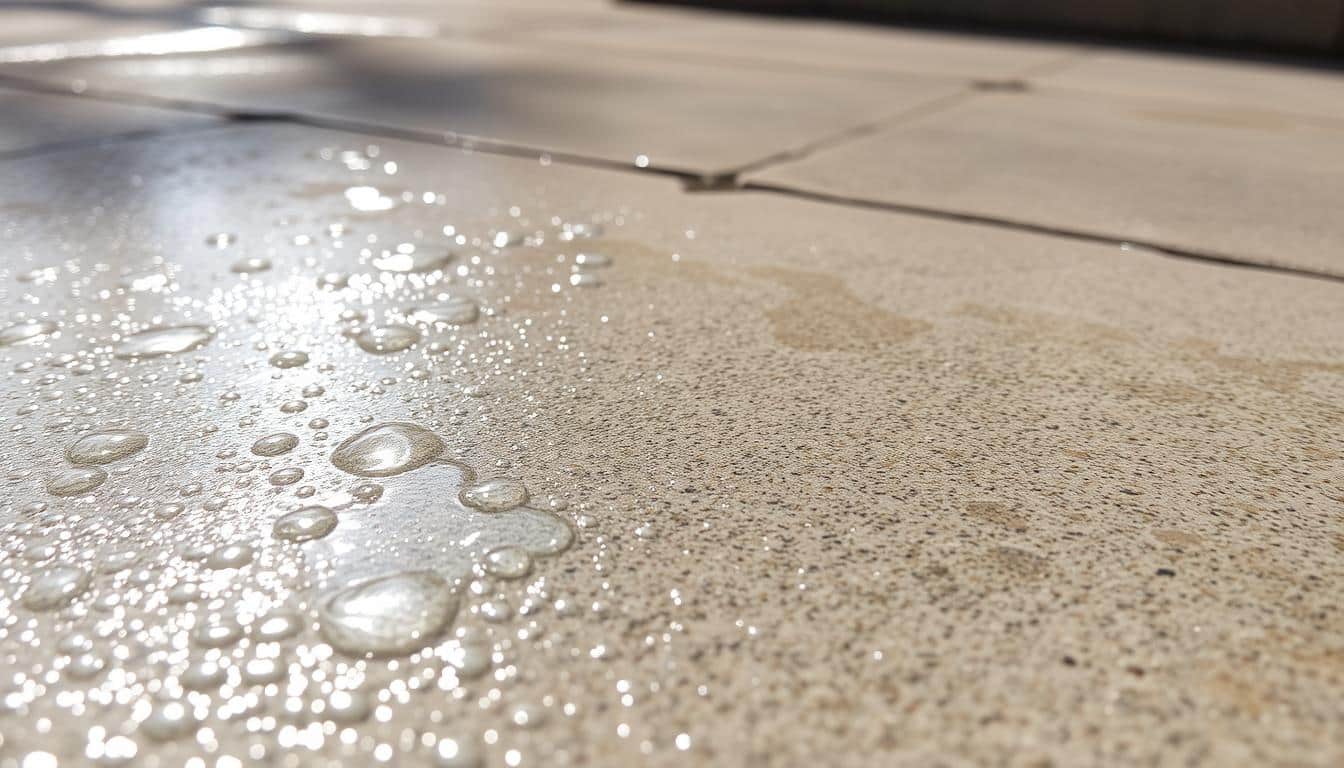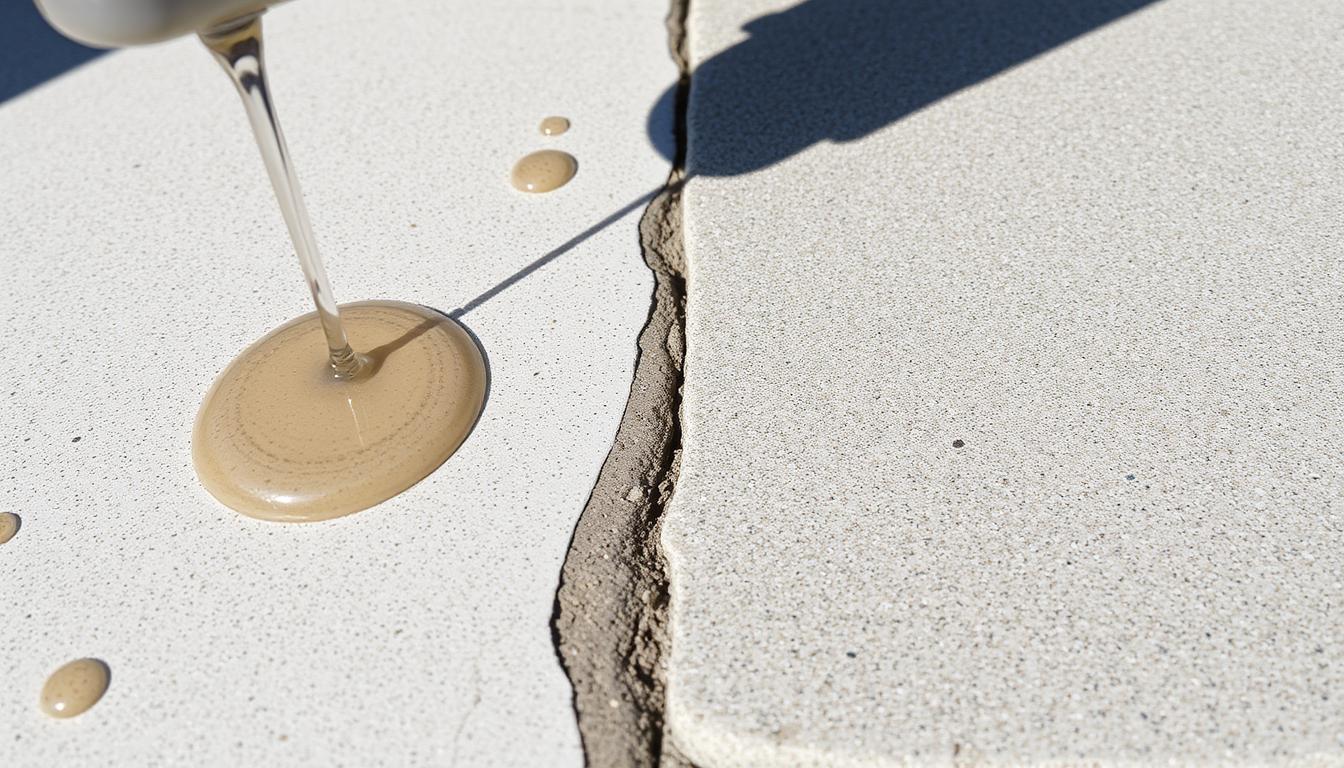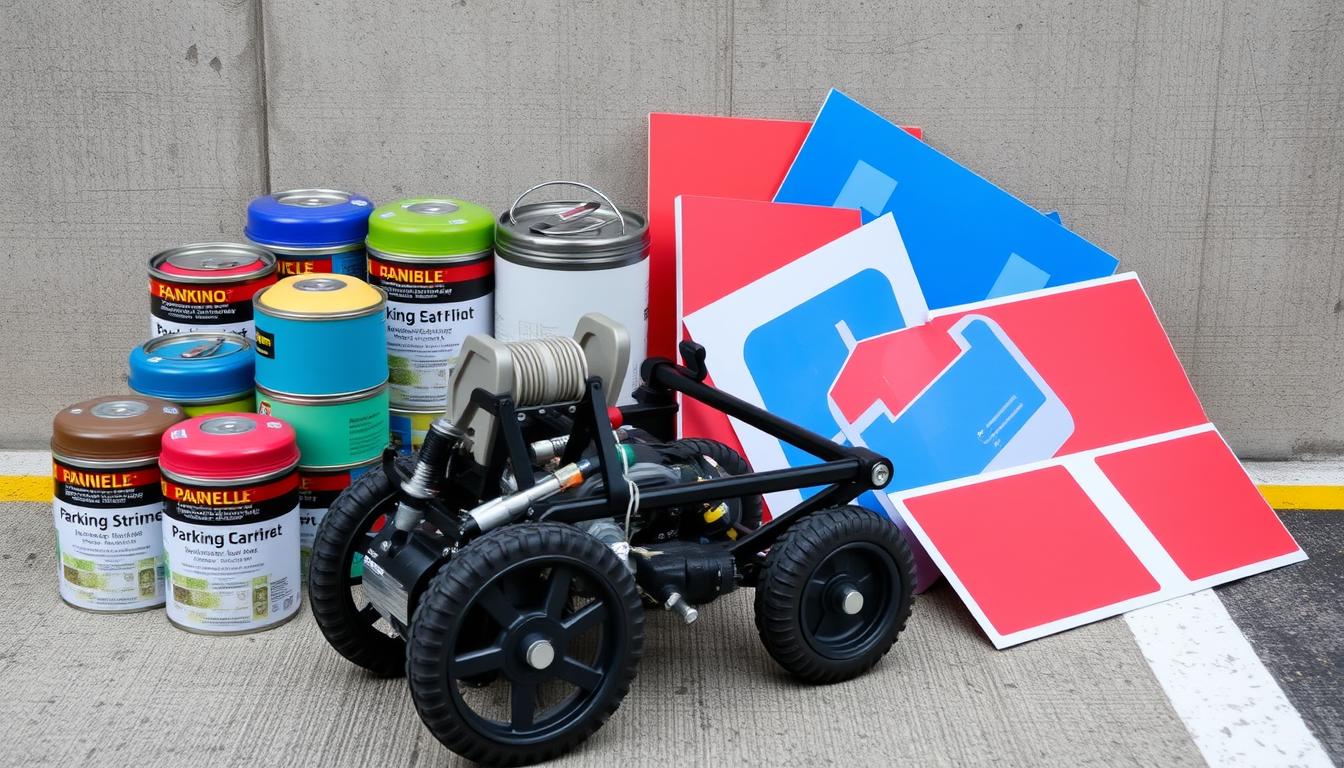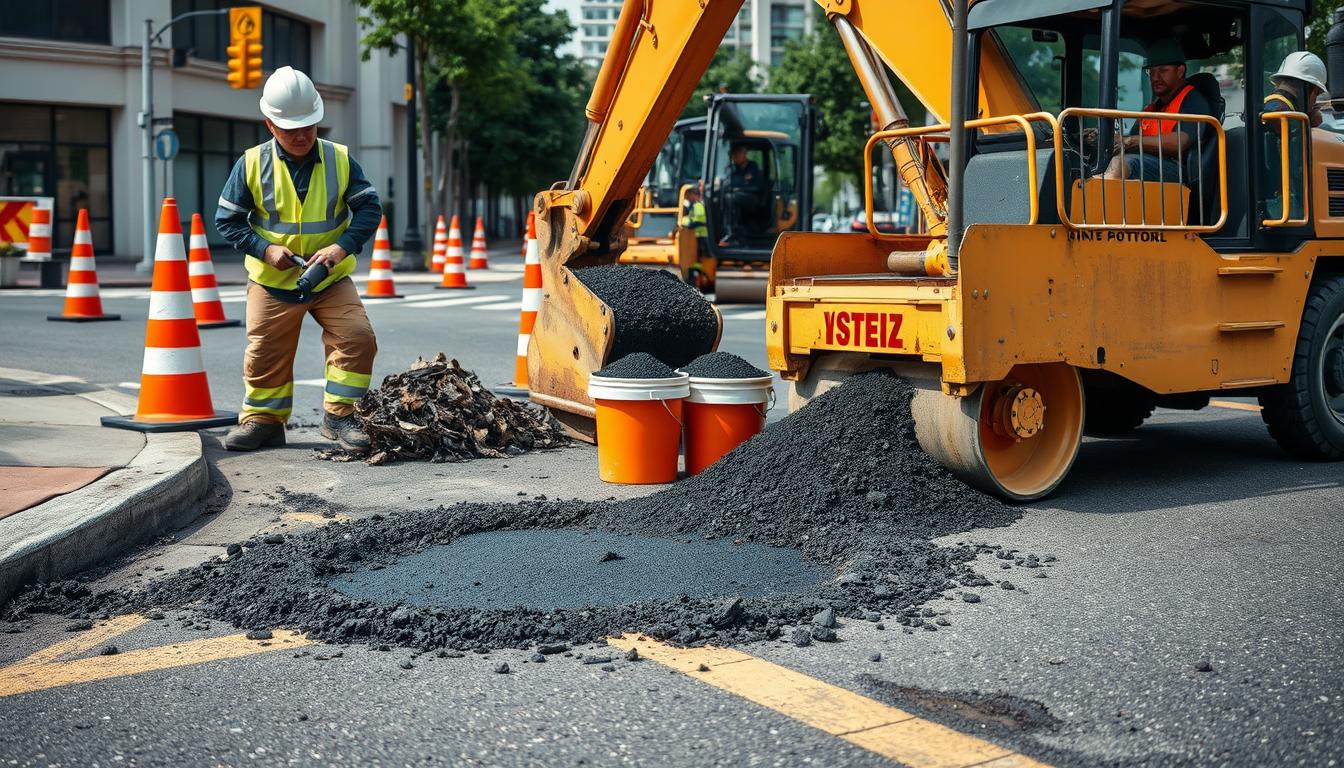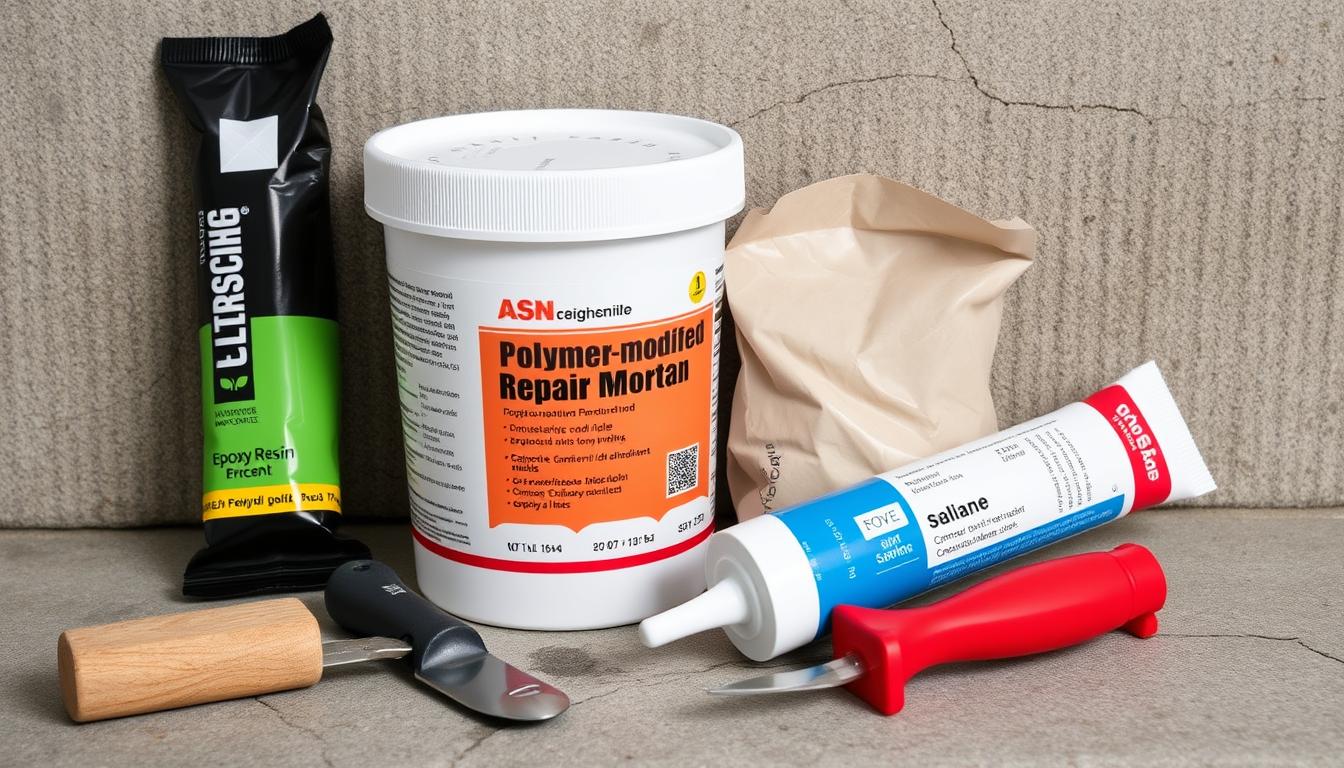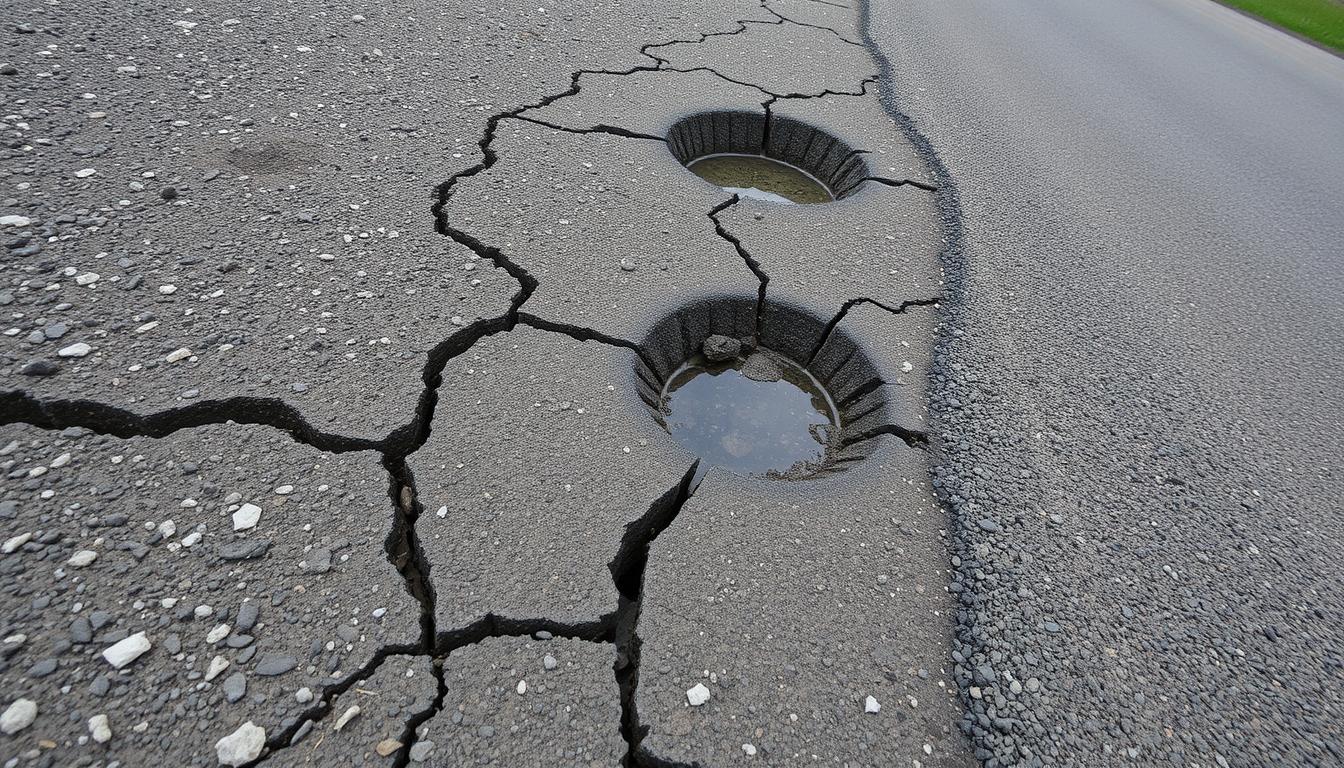Ever thought about What Types of Sealers Are Available for Concrete? or how to keep your concrete surfaces looking good and lasting long? Knowing about the different concrete sealers is key. It helps your driveways, patios, and floors stay in top shape for years. With the right sealer, your concrete can last up to 35 years, much longer than the usual 20 to 25 years.
By looking into the various concrete sealers out there, you can pick the best one for your needs. This way, you protect your investment and keep your concrete looking great.
There are many types of sealers, like those that block out pollutants and others that give a shiny finish. For more info on how to seal your concrete well, check out HT Paving and Seal Coating Services.
Key Takeaways
- Concrete sealers can make your surfaces last up to 35 years, much longer than 20-25 years.
- Penetrating sealers are great for outdoor use because they protect against dirt and spills.
- Film-forming sealers dry fast, usually in 20 minutes, making them quick to use.
- Water-based acrylic sealers are good for indoor use because they’re eco-friendly and have low VOC emissions.
- Picking the right concrete sealer is important for lasting and attractive results.
Understanding the Importance of Concrete Sealers
Concrete sealers are key to keeping concrete surfaces in top shape. They help extend the life of concrete, making it last longer. This means less damage from moisture, freeze-thaw cycles, and the environment, saving money and time on repairs.
Extending Concrete Lifespan
Moisture can harm concrete by freezing and expanding, causing cracks. Sealing concrete blocks up to 90% of moisture. This keeps concrete strong for years, saving owners from costly repairs. Sealers need to be reapplied every 2 to 5 years to keep surfaces protected.
Protecting Against Environmental Damage
Chemicals, UV light, and salt can damage concrete. High-quality sealers, like those for outdoor use, offer great protection. They reduce risks from salt and water damage. Proper sealing keeps concrete looking good and lasting longer.
Enhancing Aesthetic Appeal
Sealers also make concrete look better. They enhance color and finish, adding value to properties. There are many types of sealers, each with its own look and protection. They’re a smart choice for keeping concrete beautiful and durable.
Types of Concrete Sealers
Knowing about the different types of concrete sealers is key to picking the best one for your surfaces. Each type has its own benefits, making them perfect for various uses. They help keep your surfaces looking good and lasting longer. The main types are penetrating, surface, and film-forming sealers.
Penetrating Sealers
Penetrating concrete sealers soak into the concrete, creating a shield from the inside. They use silane or siloxane to keep water out and prevent damage from freezing and thawing. These sealers can block up to 95% of water, making them great for outdoor use.
Surface Sealers
Surface sealers put a protective layer on the concrete, stopping stains, chemicals, and water right away. They create a visible barrier, which is good for decorative looks. They’re loved for making concrete look better in homes and businesses.
Film-forming Sealers
Film-forming sealers offer a strong barrier against tough elements and wear. They include urethane and acrylic sealers that keep the concrete looking good while it lasts longer. These sealers are best for areas with lots of traffic or harsh weather.
Penetrating Sealers Explained
Understanding penetrating sealers is key to protecting concrete surfaces. These products control moisture and boost durability without altering concrete’s look. Silane and siloxane sealers are top choices, providing waterproofing without changing the concrete’s appearance. They deeply penetrate the substrate, fighting moisture damage effectively.
Silane and Siloxane Sealers
Silane and siloxane sealers have unique benefits. Silane sealers are great at keeping water out, creating a barrier. Siloxane sealers, on the other hand, repel water well. They can go 2-4 inches into concrete, lasting a long time.
It’s vital to apply them when it’s warmer than 55°F. The surface must be clean, dry, and have a neutral pH for best results.
Acrylics as Penetrating Sealers
Acrylic penetrating sealers are another choice for homeowners. They come in water-based and solvent-based types, both protecting against water and chloride. Solvent-based ones make the surface color richer than water-based ones.
For the best results, apply multiple thin coats. Acrylics can make concrete surfaces more durable.
Surface Sealers Overview
Surface sealers are key to keeping concrete structures in good shape. They form a protective layer on the surface. This layer guards against environmental damage and boosts the look of the concrete. There are three main types: acrylic, epoxy, and polyurethane sealers. Each type is designed for different needs and conditions.
Acrylic Sealers
Acrylic concrete sealers are easy to apply and make surfaces shiny. They come in solvent or water-based forms, making them good for both inside and outside use. But, they don’t last as long as some other sealers, lasting about three years.
They do offer some protection against moisture and stains. Yet, places with lots of foot traffic might need something more lasting.
Epoxy Sealers
Epoxy concrete sealers are tough and last a long time. They create a hard surface that can handle a lot of wear and tear. This makes them great for inside areas and places with lots of people walking by.
Studies show epoxy coatings last twice as long and are twice as strong as acrylic ones. They also keep water out and protect against freeze-thaw damage. This is very important in areas with big changes in weather.
Polyurethane Sealers
Polyurethane sealers are flexible and strong. They resist scratches and chemicals well. This makes them perfect for busy commercial spaces.
They also protect against UV damage and handle changes in moisture well. When choosing between epoxy and polyurethane, it depends on what the project needs. You have to think about both function and looks.
Film-forming Sealers: A Deeper Insight
Film-forming sealers are key in making concrete surfaces better. They protect and look good. Knowing the types helps pick the right one for any job. Each has its own benefits and downsides that affect how well it works and lasts.
Types of Film-forming Sealers
The main types are acrylic, polyurethane, and epoxy. Acrylics create a thin shield. They’re cheap, costing $1.00 to $2.00 per square foot for 5000 square feet. But, they need to be reapplied often.
Polyurethane sealers are harder and need less upkeep. They’re great for inside use. Epoxy sealers cost more, from $1.75 to $3.00 per square foot. They dry slowly but are best for places with lots of foot traffic.
Pros and Cons
Sealers have many benefits. They make concrete look shiny and last longer. They also protect against stains and chemicals.
But, they need to be reapplied every 2 to 5 years. If applied wrong, problems like bubbles can happen. How well they work depends on where they’re used and the environment.
Choosing the Right Sealer for Your Project
Choosing the right sealer for concrete is important. It affects how long and how well the concrete lasts. For homes, people want it to look good. For businesses, it needs to handle a lot of use and weather.
Considerations for Residential Projects
Homeowners want their driveways and patios to look great. They can choose from different types of sealers. Some keep water out, while others make the concrete shiny.
It’s important to wait 28 days after the concrete is laid before sealing. This makes sure the sealer sticks well.
Factors for Commercial Applications
Businesses need concrete that lasts a long time. They face a lot of wear and tear. That’s why they use strong sealers like polyurethane and epoxy.
These sealers can last over 10 years. Choosing the right one helps keep the concrete in good shape. It saves money on repairs and upkeep.
The Benefits of Using Sealers
Concrete sealers are key to keeping concrete surfaces in top shape. They protect and extend the life of treated areas. They offer great stain protection and make surfaces more resistant to water and chemicals.
Protection Against Stains
Concrete is prone to stains from oils, chemicals, and more. Without sealers, up to 80% of concrete can crack, spall, and stain. Sealers can cut down staining by about 60%, making upkeep easier.
Sealed surfaces stay cleaner and look better with less work. This is a big win for property owners.
Resistance to Water and Chemicals
Sealers boost a surface’s defense against water and chemicals. They shield against freeze-thaw damage and harmful salts in de-icers and cleaners. Sealed surfaces can handle harsh weather better and last longer.
With regular care, sealed concrete can last up to ten years longer than unsealed. This saves on repair costs and keeps surfaces looking good.
Application Methods for Concrete Sealers
Choosing the right way to apply concrete sealers is key for protecting and lasting concrete surfaces. There are two main ways: spray application and roller application. Each has its own benefits and should match the project’s needs.
Spray Application
Spray application is great for covering big areas fast and evenly. It’s best for big places like roads and large patios. It also works well on complex patterns and textures.
Use airless sprayers to avoid mess and get a smooth finish. Make sure the surface is clean and dry for better adhesion. Follow the manufacturer’s instructions for the best results.
Roller Application
Roller application is better for small areas or where you need more control. It’s less likely to cause overspray and can apply thicker layers where needed. Rollers are perfect for vertical surfaces like walls or curbs.
Prep the surface well to ensure the sealer sticks. Choose the right roller for your sealer type to get the best results.
Maintenance Tips for Sealed Concrete
Keeping sealed concrete in good shape is key to its long life and protection. Regular cleaning and re-sealing help a lot. This care boosts your concrete’s life.
Regular Cleaning Practices
When cleaning sealed concrete, use products that won’t damage the seal. A soft-bristle broom or mop with a gentle cleaner is best. Stay away from acid cleaners, as they can harm the concrete and weaken the seal.
Quickly dealing with stains keeps your concrete looking good and lasting longer. High-traffic spots need more cleaning to avoid damage.
Re-sealing Recommendations
Re-sealing concrete is vital to keep it protected. You should do it every 1-3 years, depending on how much it’s used and the sealant type. Busy areas might need it more often.
Remember, most concrete damage comes from moisture. Re-sealing regularly helps a lot. Watch for signs of wear or fading to know when to re-seal. Choosing a good sealant and preparing the surface well can make a big difference.
HT Paving and Seal Coating Services: Your Trusted Partner
HT Paving and Seal Coating Services is a family-owned business. We focus on top-quality concrete solutions in the Bay Area. Our long experience helps us meet and exceed our clients’ needs, ensuring durability and beauty.
Our Commitment to Excellence
At HT Paving and Seal Coating Services, quality is our top priority. We aim to make every customer happy with our work. Our team is skilled in making surfaces last longer and look better.
Why Choose Us for Concrete Sealing
Choosing HT Paving and Seal Coating Services means getting reliable concrete sealing. We offer a variety of services for different projects. Our team uses the best techniques and materials for lasting results, whether it’s for homes or businesses.
Contact HT Paving for Your Concrete Needs
Need top-notch concrete sealing and paving services? Look no further. HT Paving is here to help with resurfacing, sealing, and more. We focus on quality and durability in every project.
Making It Easy to Reach Us: (415) 774-6424
For dependable service, call HT Paving at (415) 774-6424. Our team is eager to assist with your concrete needs. We provide quick, effective solutions to your questions.
Service Areas: Bay Area and Surrounding Areas
HT Paving serves the Bay Area and nearby areas. We’re dedicated to excellence in paving and sealing. Choose us for long-lasting, beautiful concrete surfaces.
Final Thoughts on Concrete Sealers
When thinking about keeping your concrete in top shape, remember the importance of quality sealers. They protect your surfaces from damage and stains. They also help keep your concrete looking good for a long time.
Choosing the right sealers is key. They make your concrete last longer. Professional contractors use the best materials and methods for even better results.
Investing in Quality for Longevity
Deciding to seal your concrete is a big choice. It affects how your concrete looks and lasts. Eco-friendly sealers are a good choice because they’re better for the environment.
Doing it yourself might save money, but it can be tricky. It’s best for those who know how to prepare and apply the seal correctly.
Ensuring Safe and Durable Pavements
Sealing your concrete makes it safer and more durable. It prevents slippery surfaces when it’s wet. Knowing the different types of sealers helps you choose the right one.
Whether you hire a pro or do it yourself, quality is important. It ensures your concrete looks and stays great.

